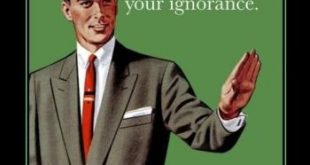Still no. 1 ! [embedded content]
Read More »Om ekonomiskt vetande — Fronesis nr 54-55
Om ekonomiskt vetande — Fronesis nr 54-55 Efter den globala finanskrisen 2008 har den ekonomiska vetenskapen hamnat i blickfånget. Studentrörelser och heterodoxa ekonomer har kritiserat det dominerande ekonomiska paradigmet och krävt ökad pluralism. Den senaste tidens politiska utveckling har blottat nyliberalismens brister och aktualiserat frågan om dess koppling till den ekonomiska vetenskapen. I Fronesis nr 54–55 fördjupar vi oss i det ekonomiska...
Read More »The use of mathematics in physics and economics
The use of mathematics in physics and economics My idea is to examine the most well-known works of a selection of the most famous neoclassical economists in the period from 1945 to the present. My survey of well-known works by four famous mathematical neoclassical economists (Samuelson, Arrow, Debreu, Prescott) who all won the Nobel Prize for economics, has not revealed any precise explanations or successful predictions. This supports my conjecture that...
Read More »1980s nostalgia (personal)
My youngest — born in 1999 — asked me the other day what kind of music her dad listened to back in the swinging 80s. So here, Linnea, is a little taste of paternal nostalgia: [embedded content][embedded content][embedded content][embedded content][embedded content][embedded content] And, when it came to dancing, this was the absolute favourite: [embedded content]
Read More »Why IS-LM doesn’t capture Keynes’ approach to the economy
Why IS-LM doesn’t capture Keynes’ approach to the economy Suppose workers are unemployed. As a result, although willing to work even at lower wages, they are unable to buy consumption goods. As a result, firms are unable to sell those goods if they produced them. So they do not employ the workers who, as a consequence, do not have the wages to buy the consumption goods. The economy is caught in a vicious cycle of deficient demand. According to the IS/LM...
Read More »Endogenous growth theory — a crash course
Endogenous growth theory — a crash course
Read More »Postmodern mumbo jumbo soup
Postmodern mumbo jumbo soup The move from a structuralist account in which capital is understood to structure social relations in relatively homologous ways to a view of hegemony in which power relations are subject to repetition, convergence, and rearticulation brought the question of temporality into the thinking of structure, and marked a shift from a form of Althusserian theory that takes structural totalities as theoretical objects to one in which the...
Read More »Årets dumstrut i Malmös politik
Årets dumstrut i Malmös politik MALMÖ. Klagomålen på den kommunala förskolan har mer än fördubblats de senaste två åren, men det oroar inte Rose-Marie Carlsson (S), ordförande i förskolenämnden. – En ökning av klagomålen behöver inte betyda att det blivit sämre. Tvärtom, säger hon. Omorganisationen 2013, då förskolan fick egen nämnd och förvaltning, innebar även ett nytt sätt att arbeta med klagomålshantering. –Det är enklare nu för vårdnadshavare att lämna...
Read More »What is ergodicity?
Why are election polls often inaccurate? Why is racism wrong? Why are your assumptions often mistaken? The answers to all these questions and to many others have a lot to do with the non-ergodicity of human ensembles. Many scientists agree that ergodicity is one of the most important concepts in statistics. So, what is it? Suppose you are concerned with determining what the most visited parks in a city are. One idea is to take a momentary snapshot: to see how many people are...
Read More »Mainstream economics — sacrificing realism at the altar of mathematical purity
Mainstream economics — sacrificing realism at the altar of mathematical purity Economists are too detached from the real world and have failed to learn from the financial crisis, insisting on using mathematical models which do not reflect reality, according to the Bank of England’s chief economist Andy Haldane. The public has lost faith in economists since the credit crunch, he said, but the profession has failed to thoroughly re-examine its failings to...
Read More » Lars P. Syll
Lars P. Syll








